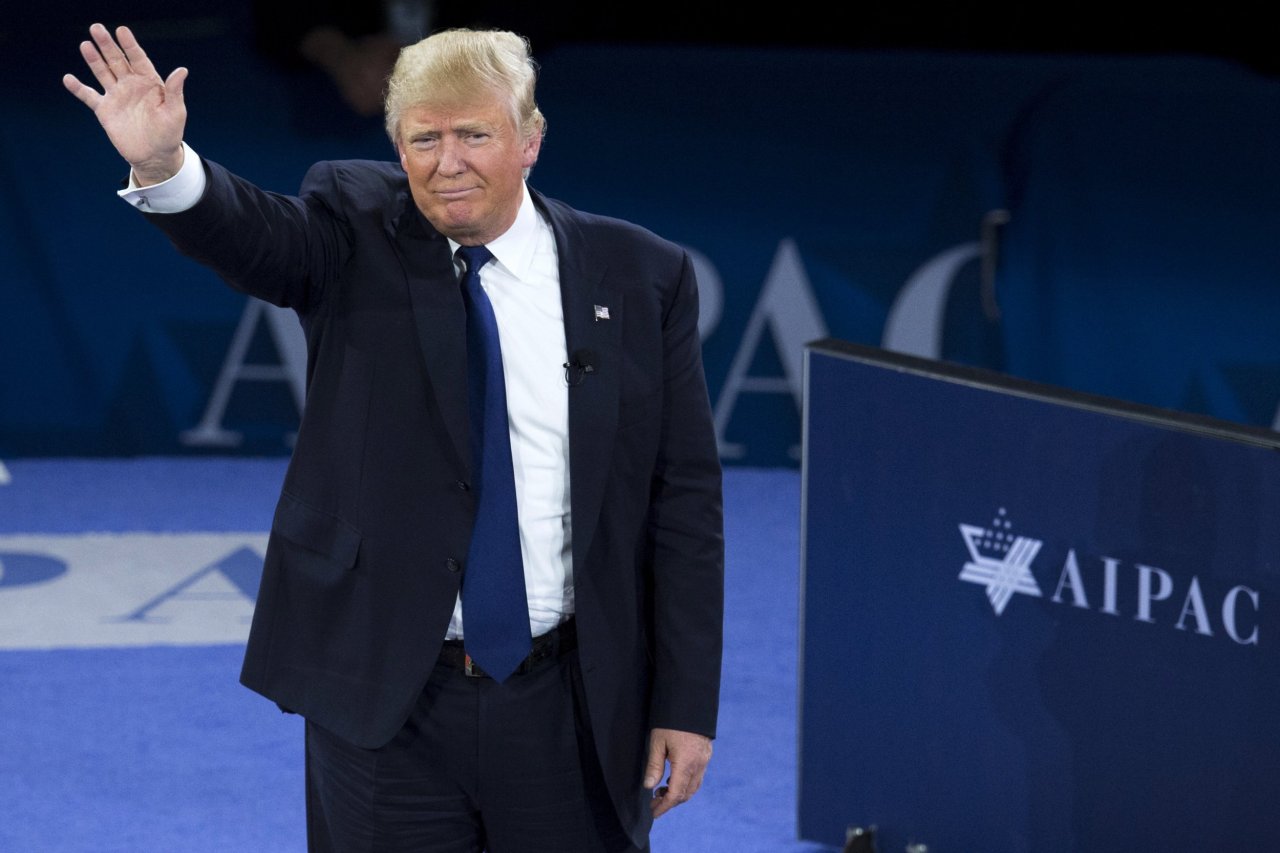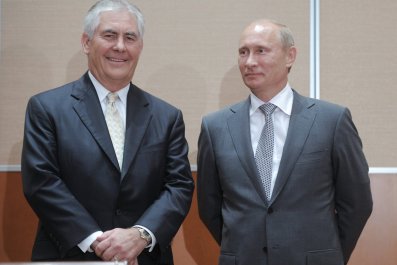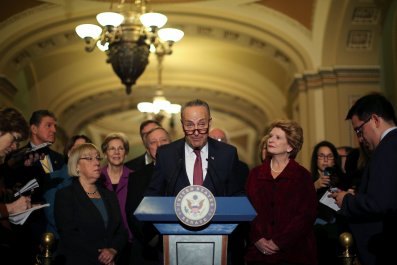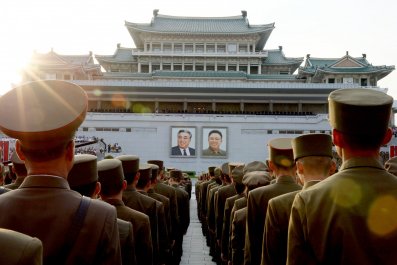For two days and two nights in December, the Israelis and their American friends in Washington, D.C., convened among the carolers and Christmas trees at a luxury hotel near the White House. It was supposed to be Haim Saban's political bar mitzvah, the ultimate celebration of his president-making powers. In 2016, the billionaire emerged as the most influential Israel donor to Hillary Clinton, and most of the Israeli-American policy world turned out for his 13th annual Saban Forum: think tank policy wonks, ribbon-decked retired generals and diplomats who had sweated over the intractable peace process. Knesset members on the right and left flew in from Tel Aviv, along with Israeli Defense Minister Avigdor Lieberman, a hard-liner sometimes described as a potential challenger to Prime Minister Benjamin "Bibi" Netanyahu, who beamed in by satellite.
But instead of toasting Saban's candidate or getting their pictures taken with the president-elect, the participants could only guess at what Donald Trump—who wasn't invited—might do in the Holy Land.
The Queens, New York-born real estate mogul will be inaugurated at a pivotal moment in Israel, when the American-backed idea of a two-state solution—that is, dividing land between the Israelis and Palestinians—is closer to being cast into Gehenna, the biblical word for hell, than ever before. As Lieberman put it, bellowing in the ballroom when asked about the peace process: "There is no peace! There is no process!"
No one in the room pretended to know what lies ahead, but one concern vexed them all: Would Trump be bad for Israel? Or, as some Israelis hope, will he be the country's Santa Claus?
A Massive Lump of Coal
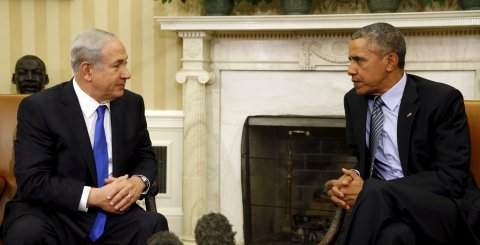
The first thing to understand about what Trump's getting into is that Israel already had a Santa Claus: President Barack Obama. But he didn't get a lot of milk and cookies in Jerusalem. Despite forking over considerable amounts of American defense money, he and Netanyahu have had a famously frosty relationship.
Their problems began in June 2009, barely five months into his presidency, when Obama gave what was billed as a historic speech to the Arab world in Cairo, becoming one of the few U.S. presidents to publicly tell Israel to stop building settlements on what America—and most of the world—views as Palestinian land. Netanyahu responded with a massive lump of coal: He green-lit new settlements. To emphasize the point, Israel's Ministry of the Interior timed the announcement of 1,600 new housing units on occupied land to coincide with a visit by Vice President Joe Biden.
The Obama administration officially backed a two-state solution, but the process quickly stalled. A later effort spearheaded by Secretary of State John Kerry also failed. Polls show that Israelis and Palestinians support a two-state solution; Israeli hard-liners would rather there be no Palestinian homeland at all, but if pressed, they might accept one in which Palestinians are crammed into Gaza. Others dream of Palestinians being absorbed into one of the Arab countries.
Obama's anti-settlement stance wasn't that different from the one taken by prior administrations, but his vocal and early opposition earned him the hard-liners' lasting enmity. That distrust was exacerbated when the two sides fell out over the Iran nuclear deal, a multilateral treaty that slowed but did not end Iran's nuclear ambitions. In 2014, Netanyahu—invited by Republicans—made a widely criticized and unprecedented address to the U.S. House of Representatives to try to persuade lawmakers not to pass the treaty. He failed, but the move showed how much contempt he had for Obama.
The feeling seemed to be mutual—especially after the Israelis prematurely, and without prior discussion, unleashed Stuxnet, a super-secret cyberweapon developed with America's National Security Agency, on Iran in 2010, according to NSA whistleblowers in Alex Gibney's documentary Zero Days. Yet Obama has lavished hefty amounts of defense money on Israel. In September, the president signed a whopping 10-year, $38 billion deal to fill Israel's defense coffers through 2028. The package means the U.S. will dole out $3.8 billion annually. Even Netanyahu had to acknowledge America's largesse. "This doesn't mean we don't have disagreements from time to time," he said in a statement, "but those disagreements are within the family."
A family, it seems, that only pretends to get along during the holidays.
The Impossible Deal
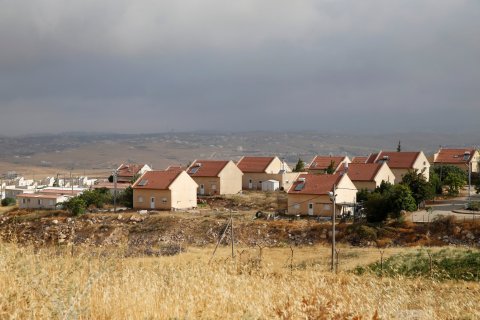
It's hard to imagine what more the Israelis might want from the United States. But many in Israel, and some American Jews, believe Obama was terrible for the country. Forget the defense spigot and productive collaborations on things like cyberweapons. Israel's hard-liners want the U.S. to support legalizing the settlements, which the United Nations has officially considered illegal since 1971.
Trump's Israel advisers seem to agree. On the campaign trail in 2016, the New York billionaire—like most Republican candidates—frequently promised to tear up the Iran deal and move the U.S. Embassy to divided Jerusalem (in previous years, Democrats have made similar promises). In March, speaking at the annual convention of the American Israel Public Affairs Committee, the powerful pro-Israel lobby known as AIPAC, Trump accused the United Nations of trying to "impose" an agreement on Israel and Palestinians.
But that doesn't mean Trump isn't interested in a deal. Before and after his election, he occasionally mused about forging the elusive Palestinian-Israeli peace accord. "A lot of people tell me, really great people tell me, that it's impossible, you can't do it," he told reporters and editors at The New York Times. "I disagree. I think you can make peace."
How he might pull it off is as unclear as his personal feelings about Israel and Jews in general. Trump has been known to make borderline anti-Semitic comments about, for example, the sharpness of his lawyers. The extent of his knowledge about Judaism seems to be that daughter Ivanka converted to marry Jared Kushner (another New York-area real estate scion and one of Trump's top advisers) and that his three grandchildren are Jewish. He has been known to mention this when people make a fuss about his neo-Nazi supporters.
The Trump campaign was also schizophrenic on Jews. Adviser Stephen Bannon will likely be the last guy in the room with the president-elect most days. And he's the guy who made Breitbart News a home for both extreme pro-Israel writers and anti-Semites. The Trump campaign did the same, with Israel "advisers" whose pro-settlement positions put them to the right of most Israelis while still winking at Pepe the Frog and playing ignorant about anti-Semitic memes shared by Trump and his team.
But not everyone is ignoring the dog whistles. Historically, American Jews vote Democratic, and Trump won less than 25 percent of the Jewish vote. Susie Gelman, chairman of the liberal, pro-Israel and influential Israel Policy Forum, is particularly concerned. "If his appointment of Stephen Bannon—someone who led an extremist publication that has promoted expressions of hate toward all sorts of minority groups—as his chief political strategist is any indication, American Jews have much cause for concern beyond only trying to divine President-elect Trump's approach to Israel."
Trump's Israel advisers hold positions far to the right of hard-liner Netanyahu. One is David Friedman, an Orthodox Jewish bankruptcy lawyer and Trump's nominee for ambassador to Israel. Friedman sits on the board of an illegal Israeli settlement called Beit El, one of 230 in the West Bank that the State Department classifies as an impediment to peace. (Kushner's family foundation has donated money to it.) The president-elect's other Israel adviser, Jason Dov Greenblatt, is a longtime Trump Organization lawyer who has written a travel book about Israel. Neither man has any foreign policy experience.
Just before the election, both Friedman and Greenblatt released a memo outlining the Donald's positions. A Trump administration, they stated, would not automatically support the creation of a Palestinian state—something at odds with decades of American policy—and called the United Nations Children's Fund anti-Semitic.
After the election, Friedman assured Israelis that Trump will improve the relationship between the two countries. "The level of friendship between the U.S. and Israel is going to grow like never before," he told The Jerusalem Post. "And it will be better than ever, even the way it was under Republican administrations in the past."
Speaking at the Saban Forum in December, Friedman went further, stunning liberal American Jews by saying the Trump administration would freeze out J Street, the left-leaning, pro-Israel lobby group based in Washington, D.C., which has been influential in recent years. In previous interviews, Friedman called the organization "far worse than kapos," a highly insulting word for Jews who collaborated with the Nazis during World War II.
Trump son-in-law Kushner, 35, is one of his top advisers on everything; he is more reticent than Friedman but is equally green at diplomacy. The president-elect has suggested he might make him a Middle East peace envoy. Lieberman, the Israeli defense minister, called the wispy Kushner "a smart, tough guy," a term he's usually reserved for the likes of Russian President Vladimir Putin. Privately, mainline pro-Israel policy analysts and advisers in Washington and New York roll their eyes when someone mentions Kushner's name—and not just because his parents' family foundation has donated money to the Beit El settlement. He "is a complete blank," says one Israel policy expert. "Trump says, 'Well, I got a Jewish son-in-law.' I've never seen him as a presence anywhere on the subject."
Exxon Mobil CEO Rex Tillerson, Trump's nominee for secretary of state, has close ties with Putin and the oil-producing Persian Gulf states but no record on Israel. And it's unclear whether the businessman will delegate the business of Middle East peace to the usual hands, the foreign policy wonks in Washington and New York whose ideas, they all admit, haven't exactly worked so far.
Half Jewish, Half Palestinian

The day after the election, Trump called Netanyahu, and the two a "warm conversation" in which the president-elect invited the Israeli leader to the White House as soon as his schedule permits. A week later, Ron Dermer, Israel's ambassador to the U.S., visited Trump at his home in Manhattan. On his way out, he assured reporters that Israel looks forward to working with the new administration, "including Steve Bannon," he added pointedly.
On camera, all good. But offstage, Trump's election poses some counterintuitive problems for Israel. For the past eight years, Netanyahu has used Obama's disapproval to keep his right flank from agitating for extreme measures. Among them: annexing parts of the West Bank, where 650,000 Israelis now live on a patchwork of legal and illegal settlements that cost an estimated $30 billion to build, and many of which are connected to each other by settlers-only highways. The far-right Jewish Home party makes Netanyahu look positively liberal: While the number of settlers under the prime minister grew by about 50,000, rightists dream of adding an additional 350,000 to the occupied territory. This would bring the total number of Israelis in the West Bank to a million, making an agonizing, Gaza-like pullout nearly impossible to imagine.
In a perhaps premature display of Trumpian enthusiasm, Israel's Knesset considered in December a bill retroactively legalizing many of the settlements. It still has several hurdles before it becomes law, but the move was a clear sign of how Trump has emboldened the country's right, according to Israeli opposition pols. The Knesset's Yoav Kisch, a member of the Likud party who voted for the bill, says he thinks Trump "can change the whole thing" with a different attitude on settlements. "We believe settlements are not an obstacle for peace," he says. "We heard Trump say that too."
But if and when the new presidential administration buys into that dream, Netanyahu will be faced with a major dilemma, says Knesset member and opposition leader Yitzhak Herzog. Like many on the left, Herzog is a supporter of the two-state solution, and to abandon that idea is to abandon Israel's claim to being both a Jewish state and the Middle East's only democracy. Officially absorbing the West Bank and its Palestinians into Israel could lead to either apartheid or a binational state in which the Palestinians conceivably become a majority.
Herzog says, "I have said to Bibi, 'Now you will have no more excuses. You say we have a president who will give us everything you want? Well, that is also the moment of truth for Israel. Do we have a two-state solution, or are we a nation that is half Palestinian and half Jewish?' This is a real historical decision. This is a huge issue."
Herzog sees some opportunity in the chaos of Trump's transition—if the president-elect abandons his isolationist tendencies and Obama's "leading from behind" strategy. He even thinks Trump, working with Russia and the so-called "mini-quartet" of Sunni Arab nations—Egypt, Saudi Arabia, Jordan and the United Arab Emirates—could kick-start the moribund peace process.
"Leading from behind is a good policy, but some issues require perception," Herzog says. "I would say that if Trump can come to terms with Putin, they might be able to bring [Palestinian Authority President Mahmoud] Abbas into the room and move the peace process. But it's more complicated in an era where America doesn't want to be involved."
The consequences of doing nothing are dire, Herzog says. "We either have a two-state solution or, I don't know, World War III."
Art of the Steal

To bring any Palestinians to the table, Trump has to talk to them, and so far his transition team has not reached out to Ramallah, seat of the Palestinian Authority. King Abdullah II of Jordan, a regional player in the peace process, has spoken with both Trump and Vice President-elect Mike Pence.
Trump enters the White House at yet another dire time for Palestinians, who remain divided. They are politically fractured and lack a strong, unifying leader who might engage in meaningful negotiations. In late November, 81-year-old Abbas was re-elected the Palestinian Authority's leader, but rifts between his Fatah party and Hamas (which controls Gaza and has been branded a terrorist organization by the U.S. and Israel) are often violent. Also, Abbas's power in the West Bank has eroded to the point where he might not be able to serve as a negotiator.
In the U.S., Palestinians have no single-issue political megadonor like Saban, but they do have representatives in D.C. Yousef Munayyer, a writer and executive director of the U.S. Campaign for Palestinian Rights, a pro-Palestine coalition based in Washington, says Palestinians have abandoned hope that any U.S. administration will support their cause.
But Trump's administration looks particularly hostile to Palestinians for three reasons, Munayyer says. His "America First" position presages a reluctance to engage in any open-ended foreign entanglements, Kushner's family supports illegal settlements, and Trump has stacked his Cabinet with known "Islamophobes."
"Putting all of this together suggests Donald Trump will allow the radical Israeli right, which has a lock on power in Israel, to do basically whatever they please to the Palestinians," Munayyer says. "Netanyahu is Israel's Donald Trump and has been for years. He has successfully captured political office through the use of fear: fear of Arabs, fear of Iran, fear of Obama, fear of peace. He believes in building walls, not bridges. He fearmongers against outsiders and minorities and has been speaking in catchphrases and sound bites long before Trump took to Twitter's 140-character medium."
Munayyer adds that when Netanyahu advocates "two states for two peoples," as he did on 60 Minutes on December 11, he is speaking in a code that only sounds like the two-state solution. This "two states" concept allows for noncontiguous Palestinian cantons and, in some hard-liners' dreams, Jordan taking in millions of Palestinians and leaving the West Bank for Israel, a move that would surely inflame the Palestinians. Munayyer points out that the Likud platform states that its members "flatly reject" a Palestinian state west of the Jordan River.
Former Palestine Liberation Organization spokeswoman Diana Buttu, a lawyer with the Institute for Middle East Understanding, a pro-Palestinian organization based in Washington, is equally bleak. "I predict that the new Trump administration will do nothing to stop Israel and will simply ignore this issue," she says, "For the hawks in Israel who believe in perpetual denial of freedom and in stealing land, this policy works to their advantage. But for those who seek freedom, peace and a stable Middle East, this policy will prolong suffering, the denial of freedom and turn this place into an even more explosive powder keg."
The Truth About Iran
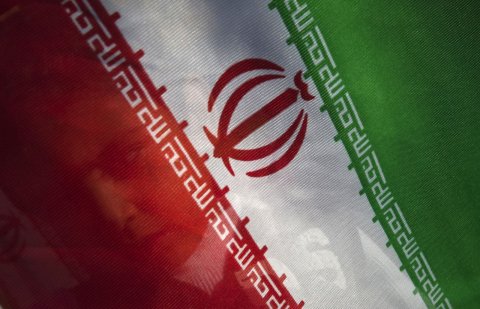
Trump's challenge in crafting an Israeli-Palestinian peace deal goes beyond the West Bank, and it's complicated by regional rivalries that make the wider Middle East even more combustible. Among the thorniest issues is Israel's opposition to the Iran nuclear deal, a multilateral agreement that the United States has signed.
Israel is the Middle East's sole nuclear power, and it would like to stay that way. On December 8, the National Security Archive, a nonprofit, nongovernmental watchdog, released newly discovered documents indicating that the United States believed as early as 1979 that Israel was testing nuclear weapons. It was not the first time someone has published information on the nation's officially secret nuclear weapons program. Israel's nukes are the unspoken element in any discussion about the country's security, Middle East peace and Iran.
Trump's "rip up the Iran deal" campaign rhetoric encouraged Netanyahu and other hard-liners who believe the treaty is bad for Israel. But, in interviews with Newsweek, Israeli and American diplomats and foreign policy administrators conceded that Israel doesn't want to "rip up" the deal. Of course, in his 60 Minutes interview Netanyahu said he had at least five ideas for how Trump could dismantle the agreement. He didn't elaborate, but since Congress approved the Iran accord months ago, insiders say the Israeli leadership has quietly decided it might be best to leave it the way it is, at least for now, since having a "bad" deal is better than nothing.
Aaron David Miller, vice president for new initiatives at the Wilson Center, who has advised both Republican and Democratic administrations over the years, predicts that Trump is unlikely to abrogate or renegotiate the agreement. That is, unless he wants a "death spiral" of retaliatory measures—the U.S. extends sanctions and the Iranians resume uranium enrichment to retaliate, for example. He says Trump's only real option in the next four years is ordering a "review" as a stalling tactic, and maybe supporting congressional efforts to impose additional sanctions.
In the meantime, the Iranians aren't waiting to see if Trump acts on his rhetoric. They apparently greeted Trump's election with another cyberattack on energy company Saudi Aramco (using technology similar to the Stuxnet computer worm, designed with American help, that Israel deployed in 2010). Vali Nasr, dean of the Johns Hopkins School of Advanced International Studies and an adviser to Obama and Clinton on the Middle East, says Tehran is worried about Trump for the same reasons that concern other world leaders: He is erratic, and they don't know what he believes in, beyond himself. Trump's Cabinet nominees for national security adviser, defense secretary and head of the Homeland Security Department—retired Lieutenant General Mike Flynn, retired General James Mattis and retired General John Kelly, respectively—are vehemently anti-Iran.
Tehran's theocratic government is often unstable, but Iran's power in the region has grown in the chaos that's ensued in the 13 years since the U.S. invaded Iraq. Tensions between Iran and the Sunni Arab nations, including Saudi Arabia, are exploding in proxy wars. And Tehran was a major player in the Syrian civil war, where its ally, Syrian President Bashar al-Assad, recently retook the city of Aleppo brutally. As secular dictators died or fled and the Islamic State militant group (ISIS) rose, some of the Sunni Arab states and Israel have struck up a behind-closed-doors entente. Trump's military and national security advisers speak of solutions—"bomb the hell out of ISIS" and "rip up" the Iran deal, for example—to a Middle East that no longer exists, Nasr says. He expects Trumpians to come to terms with the new reality, but not immediately.
"There will be a period of chaotic policy before the team begins to deal with the Middle East of 2017," he predicts. "You can't wind the clock conveniently back to 2003, but that's what these people want."
'We Have Lost'
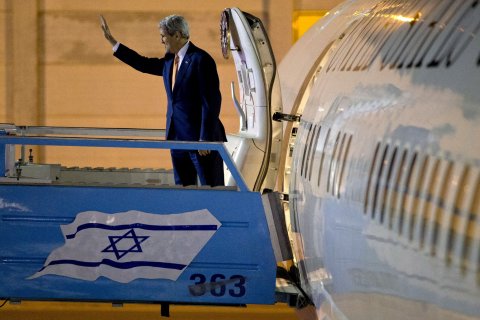
Retired Ambassador Charles Freeman remembers the old Middle East well. He served in Saudi Arabia and has witnessed years of war and fruitless negotiations. A critic of Israeli settlements, he withdrew himself from a nomination to be director of national intelligence in 2009 after fierce opposition from pro-Israel lobbyists.
Freeman says Trump's stated Israel policy is a public acknowledgment of America's failure in the region. "The two-state solution is dead," he says. "It's been a peace process for the Palestinians only, and it was a myth. The U.S. has shown definitively that we are unable to act as a broker in this area because we are 100 percent behind Israel. It's like enabling an alcoholic to do all sorts of things that are quite bad for itself. Now we have Mr. Trump and 'the art of the deal.' I am not an admirer of Mr. Trump, but I have a lot of sympathy for what he's got himself into. There is a price the U.S. pays for aiding, abetting and funding Israeli policies. We are very often among a handful of countries, isolated, and if you are gonna be 'great again,' it's hard to see how that helps."
On the last day of the Saban Forum, John Kerry, looking gaunt and weary as ever, took the stage. Jeffrey Goldberg, editor of The Atlantic and a longtime Israel pundit, sat across from him, fireside-chat style. Goldberg pointed out that Israel has ignored the U.S. government's objections to settlement expansion for decades. Kerry objected.
"I think we do—I think we do have leverage," he said.
"They never listen to you," Goldberg responded.
"No, they don't," the secretary of state conceded.
As the two spoke, it became clear to some in the room that they were witnessing a grave, decisive moment in Middle Eastern history. "It was a eulogy," says J Street founder Jeremy Ben Ami. "It was him saying, with enormous sadness and regret, 'We have lost.'"
But in the zero sum Trump World, one man's loss is another's gain. Saban, a man who made his billions importing Japan's Mighty Morphin Power Rangers to Hollywood and building a children's entertainment company, summed up the mood of the Israeli guests at his conclave. "If you belong to the right wing, it's a beautiful thing: Trump will give us a green light to do anything," he said. "If you are left wing, you are in a total state of panic and in deep need of a lot of Xanax."
Correction: A previous version of this story misstated the most common Hebrew word for hell in the Bible. It's Gehenna, not Sheol. It also misstated the origin of the word kapos, which is believed to derive from German, not Yiddish. An updated version of this story also clarified a number of points related to America's defense spending, when the United Nations declared settlements illegal and Stuxnet.



